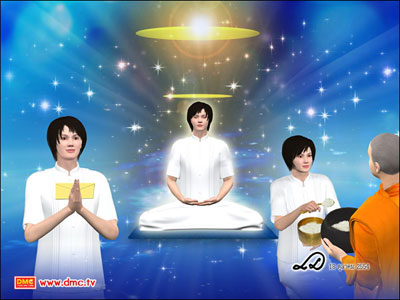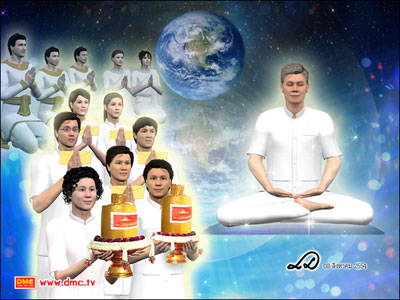Training Oneself in Non-Recklessness
by Practicing Austerity (Dhutanga)
The Lord Buddha once said, “A reckless person is like a dead person.”
Life is full of uncertainties and danger awaits those who are reckless with their lives. The Lord Buddha once said, “A reckless person is like a dead person.” Practicing austerity is one of the ways to train oneself to become more careful.
Many may not be aware that throughout the 45 years of the Lord Buddha’s propagation of the Dhamma, he gave a total of 84,000 teachings. All of them can be concluded in one word, non-recklessness. This word was in His final sermon to His disciples before entering Nibbana:
“Bhikkhus, my duties that are of benefit and support to you are now complete. In now wish to remind you that the nature of all living creatures in impermanence and degeneration. Thus, you should continue performing your duties with non-recklessness.”
When we possess care fullness, we can easily train ourselves to be righteous and virtuous. When we are reckless, the chances for misconduct through physical, verbal, and mental means will be high. Consequently, our own virtues will automatically decline.
A careful person must train himself to be mindful all the time. As human beings, we have a limited lifespan. We should make the most out of it by didigently accruing wholesome deeds. To train ourselves to be careful is to train ourselves to be constantly immersed in merit. Readers may ask, why?
In Buddhism, each individual performs both good and bad actions throughout his life. However, the manifestation of his kammic fruit will be a function of his state of mind. For example, if his state of mind is filled with evil (he thinks and acts maliciously), his present evil actions will open the doorway for his evil kammic fruit from the past, such as killing animals, to augment his present evil actions and run their course together. Consequently, he will have a short lifespan in this lifetime becauser, he will encounter unexpected misery and perhaps miss chances to accrue merit through performing good deeds.
On the contrary, if his state of mind is immersed in merit (he is kind toward others or thinks of his generosity, observance of precepts, and meditation), his present good actions will open the doorway for his good kammic fruit from the past, such as generosity, to work in tandem with the kammic fruit from his present actions, As a result, he is wealthier in this lifetime.
The Lord Buddha understood the truth about the arising of merit, which can be further broken down into three periods according to the state of mind: before, during, and agter the generous act. Before the generous act, one can accrue merit by habing a state of mind that is joyful; after the generous act, one should recall the generous act on a frequent basis. One can accrue merit through generosity, precepts observance, and meditation practice.
Practicing austerity is one of the ways to train oneself to become more careful.
How can one’s mind be immersed in merit?
According to our ancestors, one of the ways to achieve a state of mind that is full of merit is to practice austerity for three to seven days. Which includes practicing generosity.
Observing the eight precepts, and meditation. Those who wish to practice must stay at a temple. Accommodations can depend on the geographical conditions where the temples are located and their ability to provide for their students. Dwellings can be in an indoor or outdoor environment, such as a small individual room, a house, or even a long-handed umbrella as an open-air shelter placed in a field for each individual.
Some may have doubts that austere practices can help shapeee their minds to be immersed in merit or to possess carefulness as their habit. The answer is explained by the same respected senior monk from the previous chapters.
He said to his students who came to practice austerity at his temple:
“Practicing austerity by dwelling in a long-handed umbrella in the field is to follow an example of the monk’s discipline of the monk’s discipline. The Lord Buddha hade given rules for practicing austerity because of the two following major points:
1) People in this world have the same feelings.
For instance, although some are very happy now, they still fell like other people possess much more happiness than they. On the contrary, when they are unhappy even a bit, they feel like thelr unhappiness is much more than any others’ in the world.
2)People cannot differentiate between need and want.
“It we notice, problems, whether serious or not, that occur in our everyday lives have an enormous impact world’s community because people do not differentiate between need and want.
“Literally, need means a lack of something required or necessary; for example, the four basic human needs: food, shelter, clothing, and medicine. These necessities are required in our daily lives.
“Want means the desire to have, the wish to have. Beyond the basic human need, it is about the comforts in life that people long for. Commonly, when a person desires something, he thinks that he must have it because it is essential to him.
“A clearer example is when a person already has much clothing packed in his closet; somehow, he thinks he wants to buy more that are in fashion. This points out that he only wants it rather than needs it.
“Another noticeable example is that much merchandise is promoted to shoppers as free gifts. Some buy such merchandise because of the free gift. Eventually, they have collected all sorts of unnecessary items left strewn throughout the house. Because of overspending, the end result is they do not have enough money to care for their family and complain that their revenue and expenses are imbalanced.”
Training Oneself in Non-Recklessness
“In order to differentiate between need and want, our ancestors trained themselves by practicing austerity on every Buddhist Holy Day. Many teaching monks say that if a person wants to experience such a practice, you can go to a temple and dwell under a long-handed umbrella for a few nights. Then you will clearly understand what you really need or want in your life. With little space under the long-handed umbrella (with the cloth-net), you bring only what you really need rather than you will clearly understand what you really need or want in your life. With little space under the long-handed umbrella (with the cloth-net),you bring only what you really need rather than what you want. In addition, if you put more things in it, this little space will be overloaded, and you will not be able to sleep well under the umbrella.”
“Next, the requirement of wearing only white clothes while practicing austerity is to bring about consciousness and heedfulness. Dressed in white, you have to be careful when walking, eating, or even sleeping because it spots easily; and in the meantime, your consciousness develops. Eventually, you will be able to restrain yourself from the habit of a want.
“To bring about carefulness in one’s life, it must beging with the three major principles in Buddhism: to avoid bad deeds, to do good deeds, and to purify the mind. If one can completely pursue them, passage to Nibbana is open to him,
“Even if he has practiced them to his fullest in this life but is still unable to achieve it, he must still go on. Finally, there will be a day, a year, or some future lifetime when he embodies all Ten Perfections and attain Arahantaship (the perfected one), following the Lord Buddha to Nibbana.”
Based on the teachings of the respected senior monk, it can be concluded that when one practices austerity for at least three to seven days, one can train oneself to be heedful and to immerse the mind in merit. In addition to an escape from chaos, such a practice can provide a peaceful environment both physically and mentally. And in doing so, one can accrue merits in the religions world. Even when returning to the secular world, one will work with a refreshed, joyful, and virtuous mind. A person will perform his job with conscientiousness and carefulness. Problems that arise can be handled thoroughly. He will see the difference and the benefit from each time he practices austerity. Finally, problems that he had in his life will end and be replaced with ore prosperity because of his clear and powerful mind that is immersed in merit.
let’s imagine that if the 60 million people of the Buddhist population in Thailand were to train themselve3s to be heediful by practicing austerity at the same time, problems in our country would diminish in just one night. Consequently, everyone’s state of mind would become clearer. If every temple across the country were to regularly offer programs for austerity practice to the people, Thailand’s problems would come to an end. When people practice austerity at the temple, we can be sure that they will also take this practice home. Then it will become a habit to meditate at home everyday. In the end there will be no more problems in their lives.
This is the way of life that our Thai ancestors inherited long ago. However, how their heritages will be revived and supported depends on one major truth: we must be the first one (exempler) who practices them. Later, we can invite others to join us.
Considering this matter of value, I would like to invite you and your family to practice austerity at and Buddhist centers or temples located in your community. May I rejoice in you r merit in advance.
Meditation - Related Articles
" />
" />








